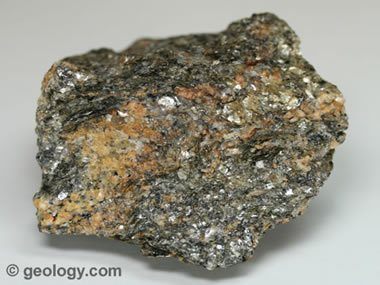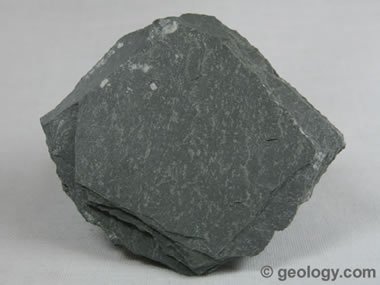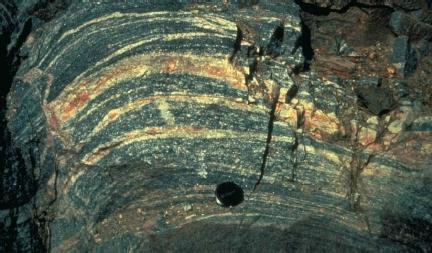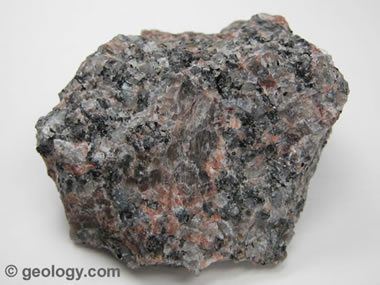Metamorphic minerals are those that form only at the high temperatures and pressures associated with the process of metamorphism. These minerals, known as index minerals, include sillimanite, kyanite, staurolite, andalusite, and some garnet.
Other minerals, such as olivines, pyroxenes, amphiboles, micas, feldspars, and quartz, may be found in metamorphic rocks, but are not necessarily the result of the process of metamorphism. These minerals formed during the crystallization of igneous rocks. They are stable at high temperatures and pressures and may remain chemically unchanged during the metamorphic process. However, all minerals are stable only within certain limits, and the presence of some minerals in metamorphic rocks indicates the approximate temperatures and pressures at which they formed.
Textures are separated into foliated and non-foliated categories. Foliated rock is a product of differential stress that deforms the rock in one plane, sometimes creating a plane of cleavage. For example, slate is a foliated metamorphic rock, originating from shale. Non-foliated rock does not have planar patterns of strain.
Metasomatism is the drastic change in the bulk chemical composition of a rock that often occurs during the processes of metamorphism. It is due to the introduction of chemicals from other surrounding rocks. Water may transport these chemicals rapidly over great distances. Because of the role played by water, metamorphic rocks generally contain many elements absent from the original rock, and lack some that originally were present. Still, the introduction of new chemicals is not necessary for recrystallization to occur.

Schist is metamorphic rock

Metamorphic Rocks | Pictures

How Metamorphic Rock Is Formed

Metamorphic Rocks

rock: text, images, music,

a type of metamorphic rock

sedimentary rock shale.

Image of Metamorphic Sample #5

surface metamorphic rock

common sedimentary rocks.

Metamorphic rocks are formed

intrusive igneous rock

Sedimentary rocks.

Metamorphic Rocks

What are metamorphic rocks?

In metamorphic rocks some or
Other minerals, such as olivines, pyroxenes, amphiboles, micas, feldspars, and quartz, may be found in metamorphic rocks, but are not necessarily the result of the process of metamorphism. These minerals formed during the crystallization of igneous rocks. They are stable at high temperatures and pressures and may remain chemically unchanged during the metamorphic process. However, all minerals are stable only within certain limits, and the presence of some minerals in metamorphic rocks indicates the approximate temperatures and pressures at which they formed.
Textures are separated into foliated and non-foliated categories. Foliated rock is a product of differential stress that deforms the rock in one plane, sometimes creating a plane of cleavage. For example, slate is a foliated metamorphic rock, originating from shale. Non-foliated rock does not have planar patterns of strain.
Metasomatism is the drastic change in the bulk chemical composition of a rock that often occurs during the processes of metamorphism. It is due to the introduction of chemicals from other surrounding rocks. Water may transport these chemicals rapidly over great distances. Because of the role played by water, metamorphic rocks generally contain many elements absent from the original rock, and lack some that originally were present. Still, the introduction of new chemicals is not necessary for recrystallization to occur.

Schist is metamorphic rock

Metamorphic Rocks | Pictures

How Metamorphic Rock Is Formed

Metamorphic Rocks

rock: text, images, music,

a type of metamorphic rock

sedimentary rock shale.

Image of Metamorphic Sample #5

surface metamorphic rock

common sedimentary rocks.

Metamorphic rocks are formed

intrusive igneous rock

Sedimentary rocks.

Metamorphic Rocks

What are metamorphic rocks?

In metamorphic rocks some or
No comments:
Post a Comment